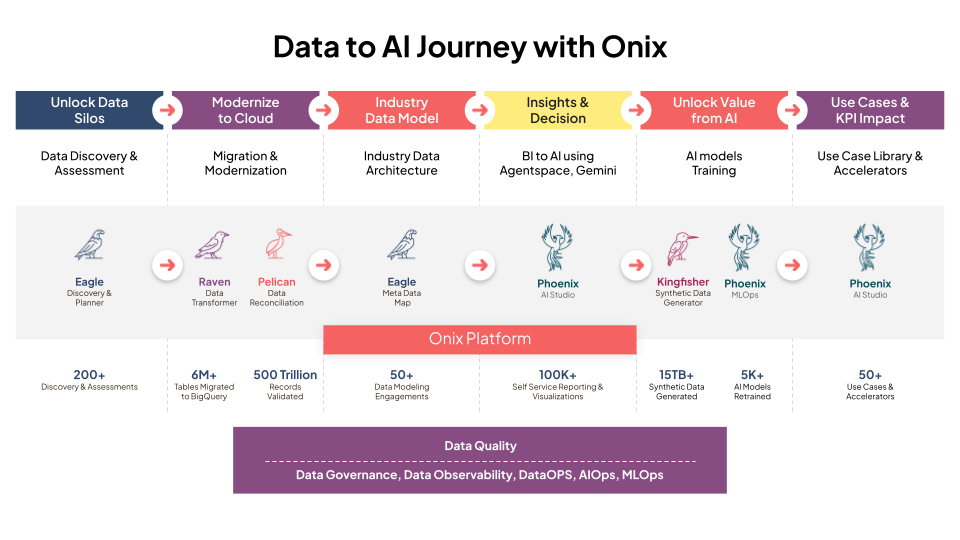According to IBM estimates, approximately 90% of organizational data is unstructured, with information stored in various formats, including email messages, PDF documents, and video files. Even as enterprises have successfully mastered structured data, unstructured data can potentially unlock the “next big opportunity” in the AI-led revolution.
Whether using structured or unstructured data, enterprises need to modernize and accelerate their “data-to-AI” journey to capitalize on their next business opportunity. Here’s how data can redefine the future of AI through the four critical shifts outlined in this blog. Let’s take a peek at these shifts and how Onix’s AI and ML solutions can play a role in each of them.
- AI-powered co-processing engine for all types of data
Going ahead, AI technology is set to play a pivotal role in managing every type of data, including structured and unstructured data. Forward-looking companies can explore the development of AI-enabled models that can seamlessly transition between structured and unstructured data, without any “silos” or inefficient conversions.
This capability can help enterprises derive quicker, accurate insights from AI systems, irrespective of the data type. Onix’s Agentic AI platform, Wingspan, is delivering this capability by integrating all data types on a single, cohesive pipeline, which can facilitate:
- Embedding AI in the Enterprise DNA
For a successful AI deployment, enterprises can no longer confine this technology to “pilot projects” or “lab experiments”. Its true potential is only delivered when AI is embedded into the enterprise DNA. This means integrating AI with ERP systems, cloud environments, and decision-making frameworks.
Enterprises can embed AI models into their DNA by rethinking their entire operating model, instead of simply retrofitting the tools into their existing workflows. This also means “grounding” AI in their unique business context and knowledge graph.
With our Wingspan platform, enterprises can enrich their metadata, business definitions, and process context, thus reducing hallucinations and sustaining AI adoption. By leveraging your data fabric, our “Business LLM” model ensures that AI models don’t simply “know more” – but know and understand your business model.
- AI prompting as a business skill
Also referred to as prompt engineering, AI prompting is emerging as a core business skill, instead of just being used by AI engineers or developers. By combining AI knowledge with domain expertise, enterprises can leverage prompt engineering to ask questions that are relevant to their business context.
Prompting skills are also about using natural, conversational language to interact with AI-powered systems. With Onix’s Phoenix AI studio, business users can effectively interact with AI models in natural language, thus delivering improved outputs, enabling faster decisions, and maximizing ROI from AI investments. As an AI-powered tool, Phoenix can enable real-time conversational interactions while delivering actionable insights to business users.
- CIOs leading the AI innovation
In today’s AI age, the role of CIOs has shifted from a “traditional” management model to a “leadership” position focused on business transformation and value creation. As an innovation enabler, CIOs can evolve as strategic leaders in the AI-led transformation drive, which can bring about a cultural change in the organizational mindset.
For instance, CIOs can boost employee productivity with their GenAI adoption, thus serving as catalysts for enterprise-level innovation and efficiency. A 2024 KPMG report reveals that CIOs can lead their enterprise AI journey by:
- Driving AI adoption into IT delivery.
- Building the AI foundation.
- Collaborating to shape the AI-led transformation.
Onix is working closely with CIOs in this transition by delivering:
- Faster data modernization
- FinOps optimization
- Industry-specific accelerators
Conclusion
The future of successful AI adoption is not in creating efficient models, but rather delivering a combination of the following 4 areas (outlined in this blog):
- Data orchestration for both structured and unstructured data.
- Enterprise-specific AI grounding for business context and relevance.
- Employee empowerment with AI prompt engineering skills.
- Leadership that can scale AI-enabled innovation to the next level.
For over 2 decades, Onix has actively worked on addressing these industry challenges through:
- Birds suite of IP tools, including Wingspan.
- Migration to Google BigQuery.
- AI/ML platforms.
How’s your enterprise unifying data and grounding AI in your business DNA? Let’s connect to know more.










